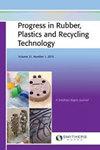Zn[B3O4(OH)3] composites fabrication based on PVC pipes scrap via comparing melt mixing and casting procedures under the effect of electron beam irradiation
IF 1.6
4区 材料科学
Q4 MATERIALS SCIENCE, COMPOSITES
Progress in Rubber Plastics and Recycling Technology
Pub Date : 2022-12-30
DOI:10.1177/14777606221147933
引用次数: 0
Abstract
In several works, scientific researchers targeted the development of polymeric materials with good mechanical and thermal properties and resist heat and fire propagation. In a new approach, this article goals to the usage of waste polyvinyl chloride (WPVC) based polymer composites derived from PVC pipes scrap filled with fixed percent of zinc borate particles (ZnB), which were prepared via two different techniques named melt mixing WPVC/ZnB (M) and casting WPVC/ZnB (C). The fabricated composites by the two methods were irradiated in an electron beam accelerator (EB) at 30 kGy. A comparative study of the thermal and mechanical properties based on stress-strain curves, tensile strength (TS), elongation at break (E %), and tear strength were evaluated. Furthermore, the rate of heat burning (%) for the two methods has been performed. Moreover, differential scanning calorimetry (DSC), Thermogravimetric analysis (TGA), Infrared spectroscopy analysis (FTIR), X-ray diffraction (XRD), and the activation energy (Ea) calculation of the prepared samples have been considered. The observed improvements in the mechanical, thermal, and flammability behavior of WPVC were succeeded by incorporating ZnB particles. The irradiated WPVC loaded with zinc borate presented a superior flame propagation fraction when matched with their corresponding unirradiated composites. Also, WPVC composite films prepared via the melt mixing method reveal more excellent properties than those equipped by the casting process for the most investigated factors. Graphical Abstract通过电子束辐照下熔体混合和铸造工艺的比较,制备了基于PVC管废料的Zn[B3O4(OH)3]复合材料
在一些工作中,科学研究人员的目标是开发具有良好机械和热性能并能抵抗热和火焰传播的聚合物材料。本文以聚氯乙烯管废料为原料,采用熔融混合法和浇铸法制备了固定比例硼酸锌颗粒(ZnB)的废聚氯乙烯基聚合物复合材料,并在电子束加速器(EB)中以30 kGy的速度辐照。基于应力-应变曲线、抗拉强度(TS)、断裂伸长率(E %)和撕裂强度的热力学性能对比研究进行了评估。此外,还计算了两种方法的热燃烧率(%)。此外,还对制备的样品进行了差示扫描量热(DSC)、热重(TGA)、红外光谱(FTIR)、x射线衍射(XRD)和活化能(Ea)计算。加入ZnB颗粒后,WPVC的机械性能、热学性能和可燃性都得到了改善。与未辐照的复合材料相比,负载硼酸锌辐照后的WPVC具有更好的火焰传播率。此外,熔体混合法制备的WPVC复合膜的性能优于铸造法制备的WPVC复合膜。图形抽象
本文章由计算机程序翻译,如有差异,请以英文原文为准。
求助全文
约1分钟内获得全文
求助全文
来源期刊

Progress in Rubber Plastics and Recycling Technology
MATERIALS SCIENCE, COMPOSITES-POLYMER SCIENCE
CiteScore
4.40
自引率
7.70%
发文量
18
审稿时长
>12 weeks
期刊介绍:
The journal aims to bridge the gap between research and development and the practical and commercial applications of polymers in a wide range of uses. Current developments and likely future trends are reviewed across key areas of the polymer industry, together with existing and potential opportunities for the innovative use of plastic and rubber products.
 求助内容:
求助内容: 应助结果提醒方式:
应助结果提醒方式:


